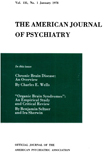Abstract
1. The rationale for using electroshock therapy is established on a solid, uncontradictable footing today, attested to by published reports, and now supplementary informal reports of many hundreds of psychiatrists who have treated many thousands of cases and are convinced that it is one of our most valuable therapeutic measures in psychiatry.
2. Outpatient ambulatory electrotonic therapy, carried out either in the office or hospital with proper safeguards by adequately trained psychiatrists, is to be encouraged.
3. Since the avoidance of every possible element of stigma to the mentally disordered person is exceedingly important, in the social and especially the economic rehabilitation of the patient, every possible means of preventing institutionalization should be resorted to which means the administering of shock therapy on an ambulatory basis whenever practicable.
4. Since there is evidence of material reduction in the suicide rate, a considerable part of this reduction being attributable to electroshock, it follows that electroshock therapy should be given to all suicidal cases unless physical contraindications preclude this.
5. Potentially suicidal melancholy patients should be administered electrotonic therapy immediately, analogous to life-saving emergency surgery.
6. The gist of this conclusion as formulated in the original paper read in Montreal, May 25, 1949, was embodied in the news release issued 24 hours later, a joint statement by Dr. William Menninger, President of The American Psychiatric Association, and Dr. Nathan K. Rickles, President of the Electroshock Research Association. I quote:
Electroshock therapy is accepted today as the most effective physical agent in the successful treatment of the majority of the affective psychoses when given by properly qualified psychiatrists.
It should be stressed that at no time is electroshock advanced as a cure-all, but only as one very effective agent in selected classes of mental illness. It should always be preceded by a complete and thorough psychiatric study of the patient, which includes an evaluation of his mental and physical status, his family and his environment, and should also be followed with adequate psychosocial study and psychotherapeutic guidance.
7. Since they have already proved invaluable in fostering psychotherapy in cases formerly considered inaccessible, research should be fostered in physiological methods in psychiatry—that is, psychosurgery, biochemistry, endocrinology, vitaminology, the various shock therapies, etc.
8. Attainment of understanding of the dynamisms involved in a given case is not enough. We must have a higher therapeutic goal, namely rehabilitation.
9. Controversies between doctors, from any specialty, concerning therapies in the stage of evolution should not appear in the public press, but should be debated at professional gatherings or in professional journals only.
10. Ethical dicta on this point are lacking in our psychiatric by-laws. The whole matter should be clarified and specific policies formulated for the guidance of all psychiatrists.
11 . The indiscriminate therapist must be controlled by corrective measures directed at him specifically, and not by nation-wide publicity of ostensibly authoritative, critical statements, which by implication appear to condemn a treatment method known to be efficacious and widely used, rather than those who administer the treatment unscrupulously.
12. Our primary aim as physicians is to help the sick attain health, and American psychiatrists endorse in proportion of 4 to 1 the use of electroshock therapy in properly selected cases, as one means for accomplishing this end. Shock therapy is no longer on trial!

